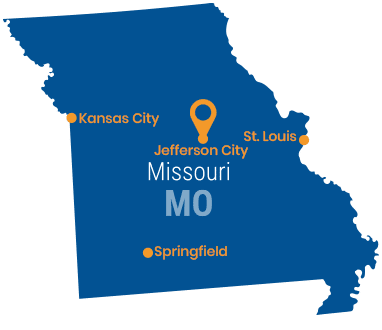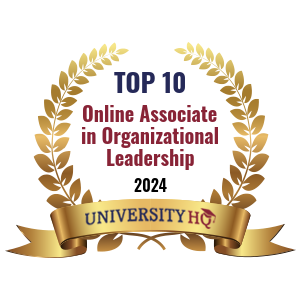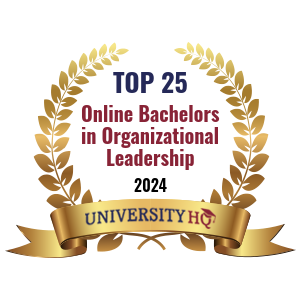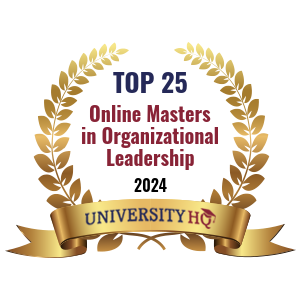What is Organizational Leadership?
A popular business sub-field, organizational leadership can lead to a wide variety of engaging career opportunities in Missouri. Graduates tend to become highly versatile professionals capable of working for companies in almost any industry.
Organizational leaders may have many different responsibilities depending on the type of company or organization that employs them. Businesses in numerous industries hire these professionals. This can result in vast dissimilarities between positions, even when the jobs share the same or similar titles. This makes it essential for applicants to review job postings carefully to ensure they fully understand potential employer expectations.
Generally, these professionals are hired to help improve overall operations. They take various steps to help companies meet established goals, such as determining how certain decisions might impact efficiency, productivity, and staff morale. In some situations, managers may also be tasked with supervising employees, promoting productive workspaces, and verifying assigned work is completed satisfactorily. Another common responsibility is ensuring staffs feel supported by their employers.

Featured Online Programs
Online Organizational Leadership Education in Missouri
According to the US Bureau of Labor Statistics (BLS), employment for management occupations is projected to grow 8% from 2021 to 2031. This is faster than the average for all professions and will result in an increase of about 883,900 new jobs over the decade. Including the replacement of workers who retire or change career fields, approximately 1.1 million management openings are expected each year. Some related professions are projected to grow more than others. Computer and information systems managers, for example, can expect to see employment increase by 28% during the same time period.
Notably, however, those who complete an organizational leadership program may also qualify for employment in many business and finance professions. Growth for these occupations is comparable, with an expected 8% increase from 2021 to 2031. This will result in an additional 980,200 applicable job openings each year.
Professional and business services is the largest industry in Missouri, accounting for $42.3 billion in revenue each year. This should result in plenty of jobs for organizational leadership professionals. Additional opportunities may also be available in other top sectors in the state such as education, healthcare, finance, retail, entertainment, and information.
Based on data provided by the BLS, 160,530 management professionals were employed in Missouri as of May 2022. The annual mean wage for these jobs was $111,290, which is significantly above the state’s annual mean wage of $54,520 for all occupations in the state. Missouri also employed 175,770 business and financial operations professionals with an annual mean wage of $78,130.
Missouri has many colleges and universities that offer an organizational leadership program and degrees in other related business subjects. Those who intend to seek employment in the state should give preference to these institutions, as they offer the most geographically relevant curriculums.
Most organizational leadership professionals in Missouri require some amount of higher education. Colleges and universities throughout the state and nation offer relevant programs at the associate, bachelor’s, master’s, and doctoral levels. Degree holders will have improved job opportunities, but those with advanced degrees tend to possess the best job prospects.
While expectations vary by employer, most companies expect job candidates to possess relevant degrees in the field. This usually means that a bachelor’s is necessary, as this is the academic standard for most management, business, and finance occupations. If you plan to seek supervisory roles, however, earning a master’s or doctoral degree may be required.
Online Associate (AS)

Associate degrees in organizational leadership generally consist of 60 credit hours of coursework that take full-time students approximately two years to complete. The majority of undergraduate programs like these are comprised of both general liberal arts core courses and major-specific classes. Students typically study basic communication, mathematics, and science subjects in conjunction with content specific to their major. This provides those enrolled with a strong academic foundation for future learning, as well as a basic introduction to the field and critical thinking skills. While curriculums vary by institution, organizational leadership programs at this level often cover topics in human resource management, employment law, organizational development, and business or corporate communication.
Graduates with associate degrees of this kind can generally pursue employment as account managers, community relations managers, training directors, diversity specialists, and executive assistant positions. They are ready to lead teams but may need more experience for higher level positions. This may be a particularly appealing option for those seeking to save money while pursuing higher education. Typically offered by community colleges, these programs often cost less than attending traditional four-year institutions. For many, this means graduating with fewer or no student loans.
It’s important to realize, however, that most companies prefer to hire organizational leadership professionals who possess more education and/or experience. As a result, graduates do not always choose to seek employment right away. Instead, they often enroll in bachelor’s programs, which can greatly improve their job prospects in the future. Previously earned undergraduate credits are also transferrable. Most colleges and universities accept up to 60 or 90 undergraduate credit hours from other accredited institutions. In most cases, those with associate degrees generally only require two additional years of education before they can graduate with more advanced degrees.
Online Bachelors (BS)

Bachelor’s in organizational leadership degrees generally consist of 120 credit hours of coursework that take full-time students approximately four years to complete. As undergraduate programs, most are still comprised of both general liberal arts core courses, general education requirements, and major-specific classes. In addition to basic communication, mathematics, and science subjects, organizational leadership programs of this kind often cover topics in organizational development, organizational behavior, business writing and communication strategies for leaders, business ethics, assessment in organizations, social conflict, and negotiation, as well as teaching problem-solving, critical thinking, and leadership skills.
Organizational leadership majors pursuing bachelor’s degrees may also be given opportunities to select concentrations. Choosing a sub-field specialty area like this can help direct instruction and prepare students for work in certain jobs.
Some options for emphasis areas that are commonly available include:
- Human Resource Management
- Finance
- Project Management
- Marketing
- Operations Management and Supervision
- International Business
Additionally, those enrolled should anticipate completing capstone projects and/or participating in internships with nearby businesses and organizations.
According to the BLS, bachelor’s degrees are typically the minimum education requirement for management, business, and financial occupations. Graduates often qualify for employment opportunities as training and development managers, management analysts, sales managers, human resource managers, and industrial production managers. Notably, however, those with skills in this field may be able to pursue jobs in many other industries, as well.
Notably, not all graduates seek employment right away. Those interested in pursuing advanced employment opportunities and higher pay potential often choose to continue their education by enrolling in master-level programs. Prospective graduate school students should be prepared to meet established minimum grade point average (GPA) and Graduate Record Examinations (GRE) score requirements set by their chosen institution.
Find Your Online Organizational Leadership Program
Online Masters (MS)

Master’s degrees in organizational leadership generally range from 30 to 36 credit hours of coursework that take full-time students approximately two to three years to complete. Graduate programs no longer incorporate general liberal arts classes. Some colleges and universities do require that incoming students have taken certain undergraduate prerequisite courses and you'll need to have a bachelor's in organizational leadership or a related field to gain entrance. This ensures those enrolled possess the necessary knowledge and skills to thrive at a more advanced academic level.
Every academic institution is different, but curriculums at this level are typically designed to help students prepare for advanced positions in the field. Coursework requirements vary, but often include topics in leadership theory, organizational behavior, business ethics, business analytics, human resource management, public relations, and marketing. Those enrolled are also likely to study organizational sustainability, corporate communication, digital media and marketing, and diversity and conflict in the workplace. Additionally, capstone projects and/or internships are frequently required.
As with bachelor’s degree programs, students are often provided opportunities to select a concentration.
Some of the most common specializations offered include:
- Global Business
- Human Resources Management
- Healthcare Management
- Nonprofit Management
- Leadership Coaching
- Social Entrepreneurship
Graduates are typically considered to have superior knowledge and skills in the field. As a result, they usually qualify for lucrative careers as business executives, management consultants, school principals, human resources managers, training and development managers, and administrative services managers.
Online Doctorate (PhD)
A PhD or doctorate in organizational leadership generally consists of between 60 and 120 credit hours that take full-time students four to seven years to complete. These are terminal degrees and, as such, are quite academically intensive. While every program is different, most curriculums are designed to prepare students for the most prestigious careers in leadership and business. These include jobs such as training and development manager, postsecondary educator, top executive, organizational development consultant, and organizational developmental director.
In order to ensure graduates possess the knowledge and skills needed to be successful in these careers, those enrolled typically study various topics related to organizational design, education law, finance, strategic management of non-profit organizations, collaborative leadership and partnership, and leadership theory and practice. While students can expect to spend the first couple years receiving traditional classroom instruction, independent study and research typically take priority as the programs progress. These degrees often culminate with the defense of a written dissertation before a board of professors.
Become a Leadership Professional in Missouri
Organizational leadership covers a wide variety of professions, each with distinctly different hiring standards and requirements. As a result, the first step to entering the field is generally determining which occupations appeals to you most. You should take some time to consider the various options carefully, keeping in mind your personal interests and aptitudes. Once you identify your ultimate career goals, the next part of your professional journey will become much more obvious.
In most cases, you will need to earn some type of academic degree. Let your preferred occupation dictate the level of education you attain, as well as the major subject you study. This ensures you acquire the necessary knowledge, skills, and training to succeed professionally. Additionally, your chosen career can help you select the most appropriate elective courses, academic minor, departmental concentration, extracurricular activities, and/or internships opportunities.
Completing an academic program(s) will likely prepare you to apply for employment in Missouri, but earning one or more professional certifications can enhance your opportunities. Many employers favor candidates with additional credentials, as they often demonstrate expertise in specialty areas and show dedication to the field overall.
Find Online Organizational Leadership Programs
There are many certifications relevant to organizational leadership. One of the most popular options, however, is the Project Management Professional (PMP) credential. It is overseen by the Project Management Institute (PMI), which is the leading professional association for project management and the authority for a global community of professions in the field. Becoming PMP certified demonstrates the ability to successfully manage projects of varying types and sizes. Notably, credential candidates must meet various requirements and then pass a 180-question examination.
Additionally, you may want to join one or more professional organizations and associations. There are several directly related to organizational leadership and all of them offer alluring benefits for members. Membership specifics vary, but participants commonly receive discounts for developmental opportunities, access to related academic journals, invitations to networking events, and much more. There are many options available, but three of the most popular groups for professionals in this field include:
- Institute of Management Consultants (IMC)
- Society for Human Resource Management (SHRM)
- National Association of Sales Professionals (NASP)
Potential Careers for Leadership Graduates
- Administrative Services Manager
Administrative services managers work to improve the overall efficiency of companies and organizations by coordinating office personnel and services. These professionals are often responsible for a wide variety of administrative office tasks including staff members supervision, interview schedule creation, and relevant record maintenance. In some cases, they may also be expected to distribute mail, ensure office machines are properly maintained, conduct office supply inventories, and order additional items as needed. According to PayScale, administrative services managers make an average base salary of $63,629 per year. - Business Consultant
Business consultants help companies and organizations improve the overall efficiency of their activities, often by addressing issues already present and recommending steps to avoid potential pitfalls. These professionals may be hired at any time, but are particularly capable of providing assistance during the start-up process. Their services are also useful when addressing specific problems or trouble areas. Depending on the situation, they may also be expected to teach current employees how to utilize various techniques and software to optimize productivity. According to PayScale, business consultants make an average base salary of $77,610 per year. - Chief Executive Officer (CEO)
CEOs oversee operations for companies and organizations, often making the majority of business decisions. While responsibilities vary, they typically supervise the performance of other high-ranking individuals, as well as formulate and enforce various strategic plans for all staff members. They must be good leaders capable of providing management and guidance to those they work with. According to PayScale, chief executive officers make an average base salary of $156,359 per year. - Community Organizer
Community organizers often create and promote targeted public awareness campaigns to achieve various desirable outcomes as directed by their employers. After securing support from leadership, this generally entails coordinating and managing group members, and giving dynamic presentations on pertinent topics. They also spend a lot of time procuring resource access for employees. Community organizers may also be expected to recruit, screen, and train new team members. According to PayScale, community organizers make an average base salary of $54,328 per year. - Executive Director
Executive directors are senior managers who take various steps to make companies and organizations more efficient, especially when it comes to important resources like time and money. To achieve this, they often put a lot of effort into designing, developing, and implementing strategic plans for success. They may also oversee vital day-to-day activities. According to PayScale, executive directors make an average base salary of $81,473 per year. - Healthcare Administrator
Healthcare administrators or healthcare managers oversee the performance of nurses and nursing assistants working in hospitals, nursing homes, correctional facilities, and primary-care medical facilities. They often have many responsibilities including coordinating staff training, conducting performance reviews for subordinates, and ensuring that their assigned area maintains proper accreditation. According to PayScale, healthcare administrators make an average base salary of $74,452 per year. - Information Systems (IS) Manager
IS managers may perform a wide variety of tasks associated with overseeing one or more IT departments. Responsibilities vary, but often include planning, directing, and coordinating various developmental opportunities, as well as hiring, reviewing, and firing non-management employees. In some cases, they are also responsible for administering technical solutions. According to PayScale, information systems managers make an average base salary of $87,257 per year.
Search All Programs
